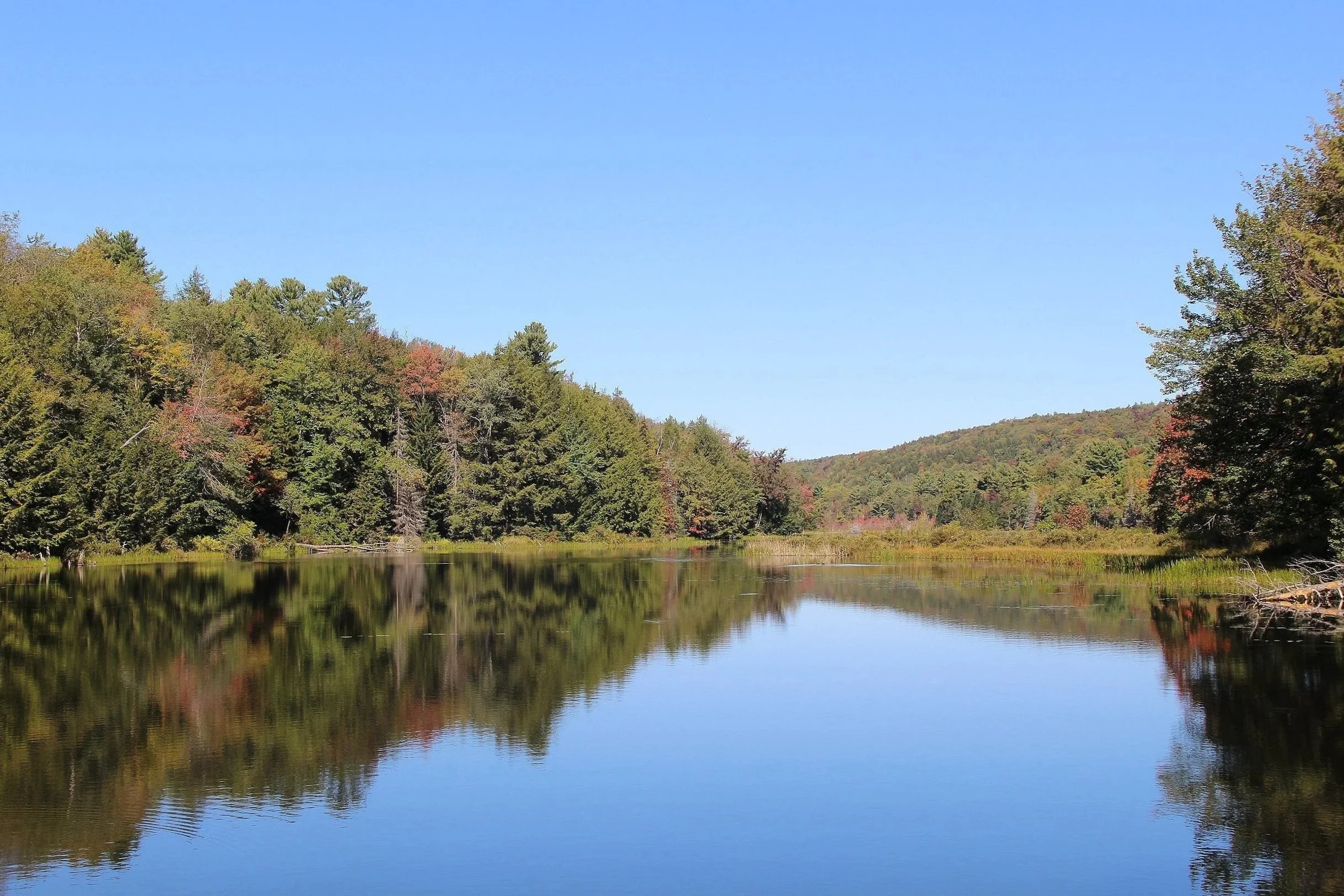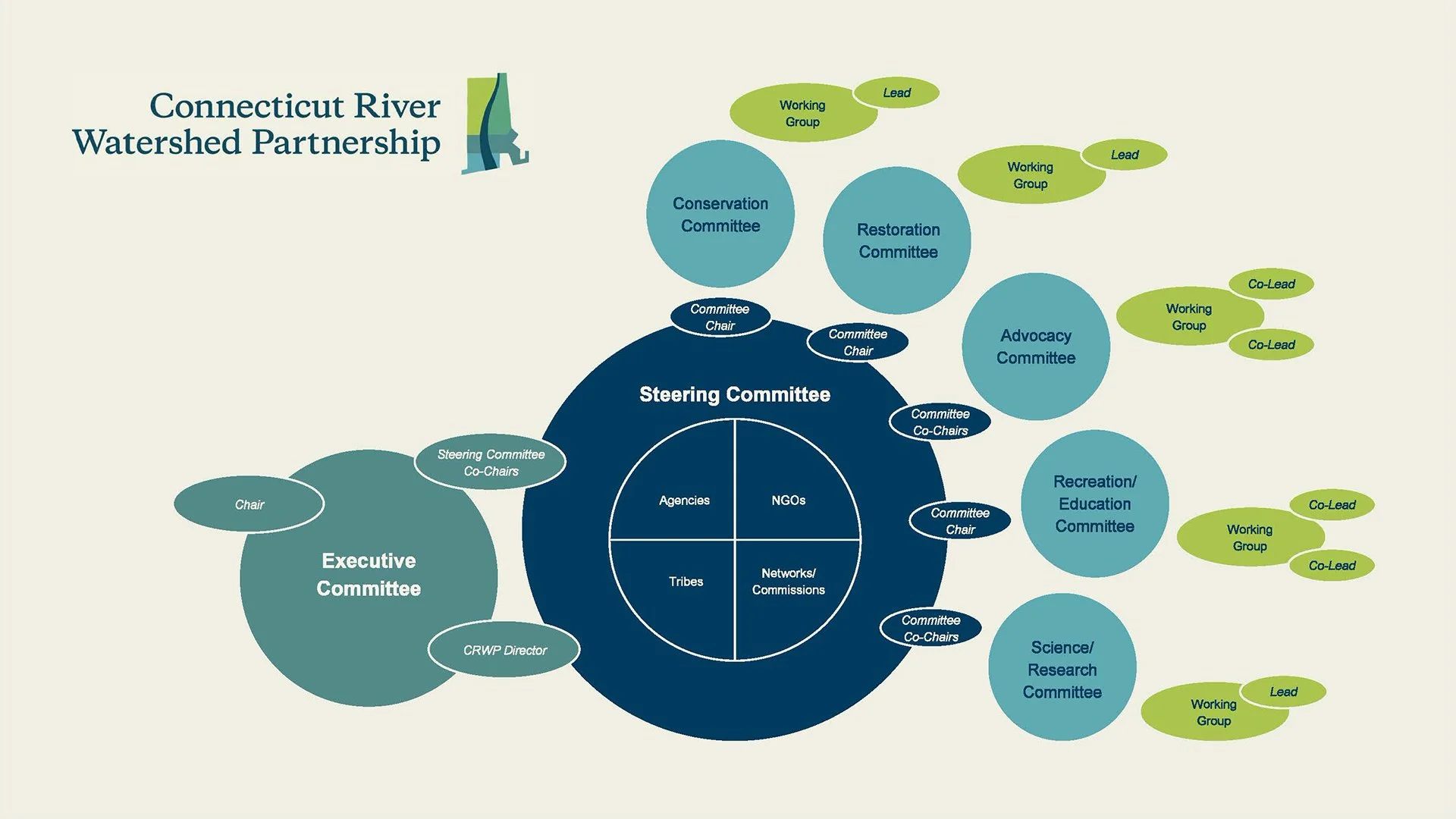
How We Work
Committees and Staff
Our governance structure includes a Steering Committee representing a mix of public and private partners working in the watershed. Committees and Working Groups are formed and led by partner groups. An Executive Committee comprised of non-profit organizations based in the watershed provides guidance and decision-making authority. The director is responsible for coordination.
Executive Committee
Chris Campany, Windham Regional Commission - Chair
Kristin DeBoer, Kestrel Land Trust
Jocelyn Forbush, Mass Audubon
David Houghton, WildLandscapes International
Jillian Liner, Audubon Vermont
Alisha Milardo, Connecticut Audubon Society
Lauren Oates, The Nature Conservancy (VT)
Rebecca Todd, Connecticut River Conservancy
Staff
Director - Markelle Smith, Mass Audubon
Steering Committee
The CRWP Steering Committee includes balanced representation from public and private sectors working in the watershed. At minimum the Committee contains the following representatives plus one Alternate member:
National NGO (2)
New England Regional NGO (2)
Statewide NGO (2)
Local NGO (2)
All-volunteer/Community-based NGO (2)
Tribal entity (2)
Regional planning commission (4)
State of Connecticut (2)
Commonwealth of Massachusetts (2)
State of New Hampshire (2)
State of Vermont (2)
US Fish and Wildlife Service (2)
Natural Resources Conservation Service (1)
National Park Service (2)
US Forest Service (1)
National Oceanic and Atmospheric Administration (1)
Committees and Working Groups
The work of the Partnership is accomplished both through participation on standing committees, representing the varied missions of our partner groups, and via the voluntary formation of working groups that are focused on specific timebound initiatives.
Committees (Active)
Advocacy Committee
Members make annual trips to Washington D.C. and host local field trips to inform and educate our Congressional representatives about the importance of the Connecticut River Watershed. We prepare an annual ‘Look Book’ highlighting critical land conservation, restoration, trail and stewardship project opportunities in all four Watershed states. The Advocacy committee is also responsible for tracking state and federal legislation important to the watershed and ensuring our partners are aware of federal funding opportunities. In addition to federal funding opportunities, we are also working to increase state funding for open space and trails in underserved communities.
Recreation and Education Committee
Our members are working to elevate the profile and identity of the Connecticut River Watershed. We aim to make the river accessible to all rural, suburban, and urban residents of the watershed. We share watershed exhibits and curricula within the extensive network of museums in the region. We seek to connect colleges and universities located in the watershed, exploring opportunities to collaborate on shared initiatives.
Committees (Inactive)
Conservation Committee
Restoration Committee
Science and Research Committee
Working Groups (Active)
Legislative Working Group
This group of partners is currently working to advance the Connecticut River Watershed Partnership Act (CRWPA): federal legislation to create a dedicated funding stream to leverage state, local, and private investments in nonregulatory conservation, restoration, education and recreation efforts in the watershed. The legislation is supported by a broad coalition of public and private organizations throughout New England who seek to diversify the organizations and sources of funding for programming within the Watershed.
Project Database Working Group
This group of partners formed to create an online project database that collates partner-led conservation, restoration and trail projects located in the watershed. The database is hosted by Mass Audubon and its creation was led by a true cross section of public and private partners working in the watershed. Projects can be bundled to create various ‘Look Books’ to address project funding needs.
Recreation Inventory Working Group
The Recreation Inventory Working Group seeks to support the vision of the CRWP by providing easy-to-find outdoor recreation opportunities for people of all ages and abilities in the Connecticut River Watershed.
The Recreation Working Group aims to:
Honor how everyone spends time outdoors
Promote both access and sustainability
Promote economic growth with measurable impacts
Create a growing base of advocates and stewards for the watershed through recreation opportunities
Create and uplift a shared identity of the watershed
Watershed Week Working Group
A shared opportunity and need identified by many of our partners is elevating the profile of the Connecticut River and Watershed. This group formed as an organizing entity around World Rivers Day (fourth Sunday of September) and Connecticut River Conservancy’s annual Source to Sea clean-up event. We seek to elevate multiple events around the watershed during that week in September, including a CRWP hosted watershed-wide BioBlitz, as well as museum exhibits and River related film festivals.
Compact Working Group
This group of partners seeks to explore the potential of creation of a four-state governor’s compact for the River and Watershed. Tackling climate impacts at a watershed scale will require enhanced coordination among states. Gaining recognition and resources for the watershed and promoting greater geographic equity are some of the goals this group is working towards.


